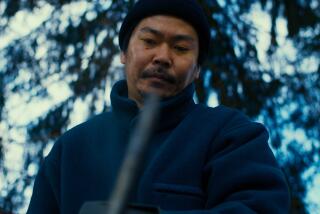Hiroshi Sakurazaka on how reality and video games changed his fiction
- Share via
Earlier this week, Jeff VanderMeer talked to science fiction writers about how their real-life experiences get absorbed into their fantastical novels. Author Hiroshi Sakurazaka — whose novels include “All you Need is Kill,” which was adapted into the Tom Cruise blockbuster “Edge of Tomorrow” — revealed the way a single video game encounter formed his approach to writing:
The year was 1995, I think.
I ran into him at a run-down arcade in Shimokitazawa.
At the time, game consoles didn’t have Internet connectivity, so if you wanted to play against someone you didn’t know, you had to leave the house and head to the arcade.
I was really into a fighting game called Virtual Fighter 2. This game took Japan by storm—back then, you could stumble into any old arcade and there would always be someone there to play against (not via the Internet!). It’s a little unimaginable these days.
At the time, I was a bored college student and had racked up twenty straight wins at the arcade near my school. I was pretty confident in my skills—I was able to change buttons with a sixtieth of a second’s notice and I had all of the combos memorized.
But the guy who invaded my turf was different—he wasn’t just good, his style of playing the game meshed well with mine. I wasn’t out to rack up victories; I just enjoyed the matches for what they were. I would purposely pick Shun Di, the worst character, and play him. He was the same way: he would use “show-offy” moves and then come back and go for the win. Close matches are the most fun.
Before I knew it, the noise around me had disappeared and I became one with the machine. All of my nerves, one by one, became concentrated onto the control panel. Everything else faded away, leaving only the arcade monitor.
My character avoided his attack; I went behind him and attempted a throw. He dodged my throw; I rolled backwards to get away. He dashed, coming after me. Sensing his throw coming, I preemptively entered the command to counter it, when his true intention, a somersault kick, connected and the match was over. I remember that moment vividly—he had won.
I got up from my seat and left the arcade without looking behind the mountain shaped multiplayers game machine. I felt like seeing his face would have spoiled the moment, ruined the impact of the heated battle that had just taken place. I keep referring to him as a “him,” but he could have easily been a she. I never caught a glimpse of his face. I don’t know his name or how to contact him. That was the only time we had ever met, and I never ran into anyone else who had that kind of play style.
I still remember him well, but there’s no guarantee that he remembers me at all. Logically thinking, I was probably the only one who thought that match was special—to him, it was likely just another match out of hundreds, thousands. But that’s why, in my head, he became larger than life—a fantasy. He had a story about him.
This experience led me to implement similar “asymmetric” relationships for heroes/villains and friends into my writing. One side may know the other very well, but the other doesn’t know him or her much at all.
In “All You Need Is Kill,” Keiji knows Rita, but Rita, who isn’t looping, doesn’t know Keiji at all. In “Slum Online,” Jack knows Tetsuo but Tetsuo doesn’t know Jack. In “Bonus Round,” Hashimoto knows who Tetsuo is, but Tetsuo doesn’t know that.
These one-sided relationships lead the person to create a story around the other. In my writing, a character creates a story about someone else in sort of a “nested structure,” and that, in turn, gives the story more depth—at least, that’s how I feel. (By the way, in my short story series “Saitama Chainsaw Massacre,” which has yet to be translated into English, I tried to take this sort of “nested structure” to the next level.)
This is only one example out of many that this generation of gamers has experienced in regards to how playing games can translate to real life. I think that taking such experiences and making them the subject or theme of my books is what I am supposed to do.
— Translated by Evan Galloway
More to Read
Sign up for our Book Club newsletter
Get the latest news, events and more from the Los Angeles Times Book Club, and help us get L.A. reading and talking.
You may occasionally receive promotional content from the Los Angeles Times.






